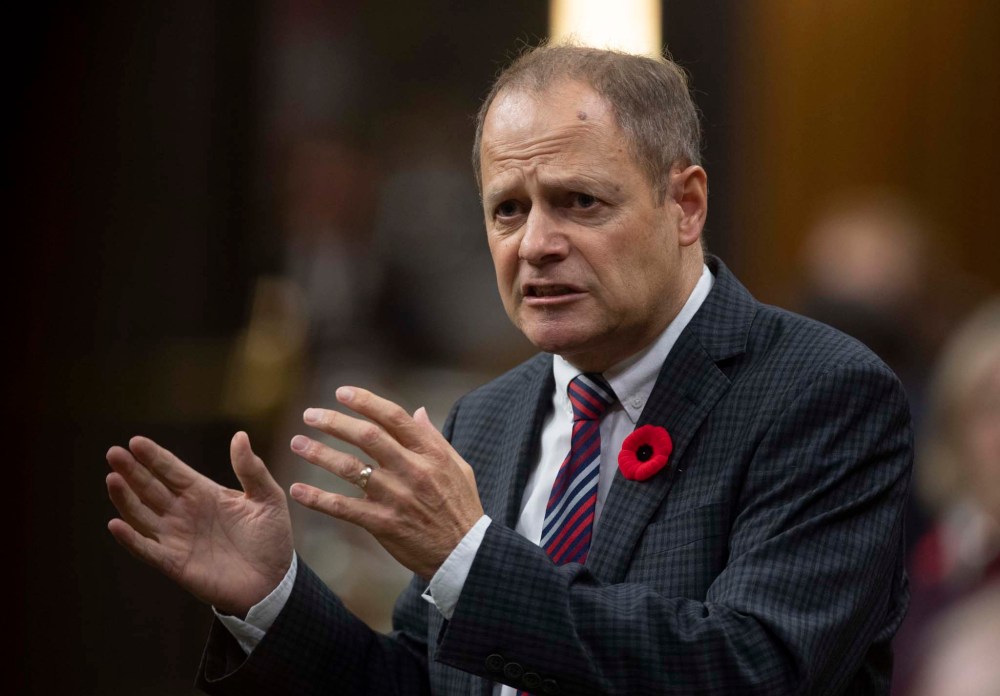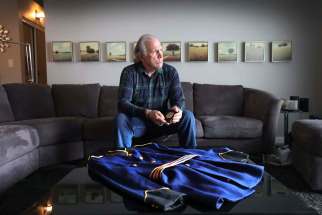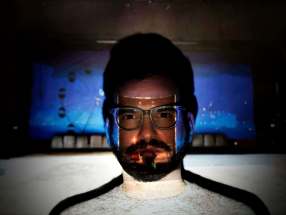To serve and be protected Retired Winnipeg inspector calls for Canada's hate speech laws to include police
Read this article for free:
or
Already have an account? Log in here »
To continue reading, please subscribe:
Monthly Digital Subscription
$0 for the first 4 weeks*
- Enjoy unlimited reading on winnipegfreepress.com
- Read the E-Edition, our digital replica newspaper
- Access News Break, our award-winning app
- Play interactive puzzles
*No charge for 4 weeks then price increases to the regular rate of $19.00 plus GST every four weeks. Offer available to new and qualified returning subscribers only. Cancel any time.
Monthly Digital Subscription
$4.75/week*
- Enjoy unlimited reading on winnipegfreepress.com
- Read the E-Edition, our digital replica newspaper
- Access News Break, our award-winning app
- Play interactive puzzles
*Billed as $19 plus GST every four weeks. Cancel any time.
To continue reading, please subscribe:
Add Free Press access to your Brandon Sun subscription for only an additional
$1 for the first 4 weeks*
*Your next subscription payment will increase by $1.00 and you will be charged $16.99 plus GST for four weeks. After four weeks, your payment will increase to $23.99 plus GST every four weeks.
Read unlimited articles for free today:
or
Already have an account? Log in here »
Hey there, time traveller!
This article was published 14/04/2021 (1707 days ago), so information in it may no longer be current.
OTTAWA — A retired Winnipeg police inspector says it’s time Canada recognize officers as a group that should be protected from hate speech, arguing protests against police will only increase the chance of racially charged shootings.
“We don’t want our moral authority undermined to the point that we have no respect at all,” said Stan Tataryn.
“This constant, derogatory hatred towards the police makes them start to doubt they have that authority, and they’ll go quicker to their weapon, or toward force.”
Winnipeg Liberal MP Kevin Lamoureux has sponsored a petition started by Tataryn, which asks Ottawa to broaden hate-speech laws to include vocations, in particular police officers.

Tataryn said he realizes the timing will irritate some people — a Minneapolis police officer is on trial for the death of George Floyd in May 2020 — but he’s been worried by what he’s seen at protests related to the death of Eishia Hudson.
The 16-year-old Indigenous girl was fatally shot by a Winnipeg officer after a high-speed chase, following a liquor store robbery, on Lagimodiere Boulevard during the afternoon rush-hour on April 8, 2020.
The officer was cleared in January after an investigation by the Independent Investigation Unit, prompting protests with signs that read “Winnipeg police are murderers.”
Tataryn believes that sign would be considered hate speech if it referred to other groups.
“Say three seniors were attacked during the year, and each of them was able to kill their assailant. And the justice system said it was self-defence. You could not say ‘seniors are murderers;’ you could not say ‘seniors killed my daughter.'”
A member of Winnipeg Police Cause Harm, which has organized anti-police protests, rejected the retired inspector’s argument.
“It’s not that people are necessarily disrespecting the institution; they’re criticizing it,” said Paula Ethans, an organizer with the group, which wants police funding diverted to social services.
“(If) the only option is to escalate and resort to violence, (it) tells me that the police don’t have the proper training to respond to incidents without violence.” – Paula Ethans
She doesn’t buy Tataryn’s argument that if police lose their moral authority, they’ll have no choice but to pull their weapons in stressful situations to compel people to listen.
“(If) the only option is to escalate and resort to violence, (it) tells me that the police don’t have the proper training to respond to incidents without violence, or they are not the proper institution to be responding to these incidents.”

University of Winnipeg criminologist Kelly Gorkoff said she was shocked by the petition, because it would likely limit freedom of speech and assembly.
“It is a very surprising way to deal with the concerns people have raised about policing,” she said
“It kind of just stops the discussion about the bigger issue, around what role policing (is) playing right now, in this contemporary social landscape.”
The Criminal Code makes it an offence to publicly communicate a statement that “incites hatred against any identifiable group, where such incitement is likely to lead to a breach of the peace” or “wilfully promotes hatred against any identifiable group,” such as race, religion or sexual orientation.
Gorkoff said the law doesn’t apply to criticism that is harsh or even unfair.
“Police aren’t really marginalized, unless I’m missing something,” she said.
“Police are granted the right to kill people, and when they misuse that right that’s granted to them, the public I think has every right to speak out against that.”
“Police are granted the right to kill people, and when they misuse that right that’s granted to them, the public I think has every right to speak out against that.” – Kelly Gorkoff
But to Tataryn, the debate in Winnipeg has gone beyond criticism.
He spent 35 years as an officer, starting in the 1970s when he says police were roundly despised and called “pigs.” The force did community outreach, and put peace officers into schools as part of a move to shore up relations with various communities.
In the past two decades, violent incidents involving police in the U.S. have influenced how Canadians talk about police in this country, Tataryn argued, and it has taken a toll.
He pointed to the case of a Winnipeg constable who took his own life in February, his family said, because he had been distressed by anti-police protests and sentiment.
Yet activists say programs, such as having police officers in schools, affects minority communities and instills in children the idea that police should be the first ones to respond to problems.
Tataryn counters that cutting those programs will result in a more adversarial relationship with the public.
“You’re driving us back to our little clique,” Tataryn said.
“You’ll undermine any moral authority the police had; you’ll take them out of the schools, you’ll put them back in the cruising cars, you’ll isolate them, and put them right back to ‘us versus them.'”

Lamoureux endorsed Tataryn’s petition because he said he believes that overwhelmingly negative comments hurt the reputation of all officers. He said the vast majority of police make Winnipeg a better city.
“There’s a great deal of merit for us to give more positive attention to law enforcement officers,” said Lamoureux, who said he was not speaking on behalf of the Liberal party.
“When it comes to law enforcement personnel, it takes just a few bad apples to portray a relatively negative image, and it’s not fair.”
The petition appeared on the House of Commons website on April 9, and had 166 signatures within five days. It will be presented to the Commons if it gets 500 endorsements by June 8.
Lamoureux, whose riding includes Point Douglas and the North End, two communities with a high proportion of Indigenous residents, said he expects pushback.
“I can recognize that a number of my constituents would be upset. But having said that, I think we have to recognize there is true value to community policing,” said Lamoureux, who said people should focus on building bridges between police and communities.
“What individuals and community groups are trying to point out is that the institution is inherently flawed.” – Paula Ethans
Ethans countered that relationship-building isn’t possible when certain groups have radically different experiences with police officers.
“What individuals and community groups are trying to point out is that the institution is inherently flawed,” she said.
Tataryn says he fears Indigenous grassroots organizers will only make the situation more tense with city police.
“I see us going in a wrong direction with our less-privileged people; that there’s groups within them that are trying to get the police away from them,” Tataryn said.
“Don’t paint us all with the same brush.”
dylan.robertson@freepress.mb.ca









